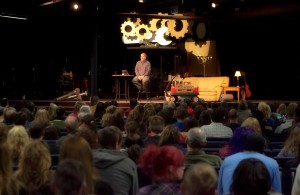 How do you feel when you think about attending a big church? Do you get excited or recoil in disgust? Does the idea of attending a big church make you feel all warm and fuzzy inside, or do you get irritated at just the thought?
How do you feel when you think about attending a big church? Do you get excited or recoil in disgust? Does the idea of attending a big church make you feel all warm and fuzzy inside, or do you get irritated at just the thought?
Recently, my brother passed along a blog posting he found written by a person who hates big churches. He started his post with, “I haven’t been to a church in over a year.” Then he went on to criticize all the things that were wrong with the large church he worked at for ten years.
For the most part, his arguments were pretty skewed, and his heart was obviously full of bitterness.
And it breaks my heart.
I truly wish I could sit down with him face-to-face and have a meaningful conversation about his past and his pain. I know he was wounded. I also know that no church is perfect. Tragically, churches, big and small, have spiritually abused too many dear people.
But here are my questions: Are big churches simply the result of pastors with big egos? Do they do more harm than good? And on the flip side, is the ultimate church a small congregation where everybody knows your name?
I grew up in small churches. I’ve pastored small churches. I’ve been doing this “church-thang” for over fifty years! I’ve also been on staff at two mega-churches and now pastor a church with a couple of thousand folks. None of this makes me an expert, but it does give me a fairly broad background and some experience to speak from.
So here are some small thoughts about big church:
1. Jesus and the church in the book of Acts did big group and small group.
For Jesus and the apostles, it wasn’t either-or but both-and. Jesus drew very large crowds of thousands, and he invested personally in a small group of twelve. The early Church met in large gatherings, and they also met daily from house to house in small groups. On its first day of existence, the “First Baptist Church” of Jerusalem baptized over three thousand people (see Acts 2:41)!
I tell people all the time, “Our church is never bigger than your small group.” We consistently challenge people to do more than just show up in the crowd on Sunday. We want them to engage in our big group gatherings and our small group encounters.
It’s not that big is better or that small is better—for me—both are needed and both are valid.
2. Big provides more resources and some amazing opportunities for community impact.
Can a small church make a big impact? Of course! The Bible is full of examples of how God used the weak and the small to do great things. So I want to be clear: big is not required to make a big splash. However, the combined resources of two, three, or ten thousand people provide a measure of financial flexibility and opportunity not afforded the typical small church of seventy. Together we can do more than we can alone. And when there are a lot more of us together, we can do even more.
Next week, our church is going on a local radio station every weekday. We’re excited about the program because 40% of the people who listen to this station don’t go to church anywhere (even though it’s a Christian broadcaster). The staff and finances it takes to pull this off are provided through the broader resources we have as a larger church.
In a couple of weeks, over six hundred high school students will be meeting in our auditorium for a Future Business Leaders of America conference. Many of these kids don’t go to church anywhere, but because we have a facility that can handle a large crowd, we can accommodate a non-church, community event such as this.
Sometimes the toughest challenge is getting people in the front door. However, hundreds of kids who might never walk into a church building will be sitting in ours and possibly thinking, “This is kinda cool.” Call me crazy, but I think that’s awesome!
Big is not always or automatically better, but big can provide some amazing opportunities to serve our communities and to reach the lost.
3. Big is safe for seekers.
I can name no less than a dozen formerly non-believing guys in our church that never would have attended a small church, but they came to our church because it provided some anonymity. When you’re far from God, the last thing you want to do is show up at a place with fifty people who all know each other and all know you’re the new guy.
Yes, I understand, it doesn’t take a crowd to lead someone to Jesus. But we’ve seen over a thousand people come to Christ in the last ten years and well over seven hundred get baptized in water.
I love to share my faith one-on-one over coffee at Starbucks. But I really love seeing hundreds of people come to faith in a large church that is a safe place for them to discover grace.
4. Heaven is BIG!
I’m always a little surprised when I hear people say, “Your church is just too big for me. I prefer an intimate and quieter setting for worship.” I usually smile, and wonder—how are they going to feel about eternity in heaven?
Here’s how the Bible describes in Revelation 19:1, 6 (NIV) what we can expect:
I heard what sounded like the roar of a great multitude in heaven shouting: “Hallelujah! Salvation and glory and power belong to our God.” Then I heard what sounded like a great multitude, like the roar of rushing waters and like loud peals of thunder, shouting: “Hallelujah! For our Lord God Almighty reigns.”
Sounds to me like rather than a small group in God’s living room, heaven is going to be an incredibly loud party with a few gazillion people. Big can be fun!
So again, let me be extremely clear—big churches can be a big challenge. Inherent in the practice of a large community is the possibility that people can be wounded, missed and forgotten. Big churches include some potentially big problems. I know.
But guess what? Small churches are not exempt from challenges either. I’ve known small churches that were ingrown, petty, ineffective and isolated. Small churches certainly include some potential problems too.
That’s why it really is not about size, but about our hearts.
Do we have the heart of Jesus for the lost?
Do we care about the outsiders as much as we do the insiders?
Are we providing a safe place for people to discover grace no matter what the size of our congregation?
Are there consistent opportunities given to people for meaningful connection with others in the body of Christ?
And even if we’re in a small church, do we have the big picture of the Kingdom of God?
I realize the average church in America is small and relatively few are mega-churches. But I also recognize this truth: God loves the Church in all her variety, forms, styles and sizes. So I suggest that we stop criticizing and casting stones at the Bride of Jesus—because big or small—she belongs to Him.

